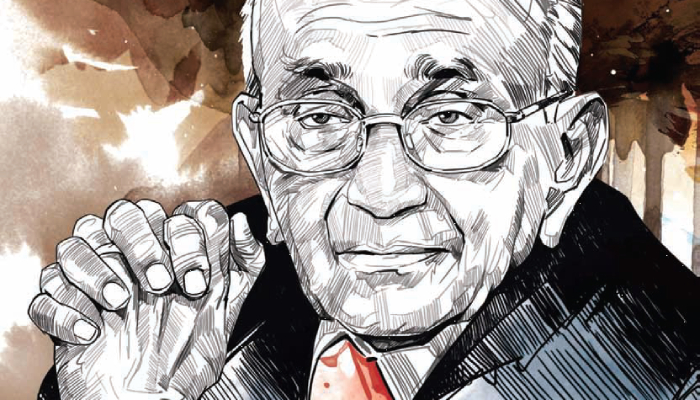
or

Prafullachandra Natwarlal Bhagwati was the 17th Chief Justice of India, serving from 12 July, 1985 until his retirement on 20 December, 1986. He introduced the concepts of public interest litigation and absolute liability in India, and for this reason is held, along with Justice V. R. Krishna Iyer, to be a pioneer of judicial activism in the country.
Born in Gujarat, he was the brother of the economist Jagdish Bhagwati and the neurosurgeon S.N. Bhagwati. He was married to Prabhavati and the couple have three daughters, Parul, Pallavi, and Sonali.Bhagwati received his education in Mumbai. He studied at Elphinstone College, taking a Mathematics (Hons.) degree from Bombay University in 1941. In 1942, he courted arrest during the Indian Independence Movement and went underground for four months. He later received a law degree from Bombay University after studying at Government Law College, Bombay
Hon’ble Justice Bhagwati began his career practicing at the Bombay High Court. In July 1960, he was appointed a judge of the Gujarat High Court. In September 1967, he was appointed the Chief Justice of that court. On two occasions, he acted temporarily as Governor of Gujarat (7 December 1967 to 25 December 1967 and 17 March 1973 to 3 April 1973). In July 1973, he was appointed a Judge of the Supreme Court of India. In August 1985, he became Chief Justice of India.
As a Supreme Court judge, Hon’ble Justice Bhagwati introduced the concepts of public interest litigation and absolute liability to the Indian judicial system. He is therefore held, along with Justice V. R. Krishna Iyer, to have pioneered judicial activism in the country.
A controversial judgment of Hon’ble Justice Bhagwati was in the ADM Jabalpur v. Shivkant Shukla case (popularly referred to as the ADM Jabalpur case or the habeas corpus case) where he decreed that during the Emergency of 1975 to 1977, a person’s right to not be unlawfully detained (i.e. habeas corpus) can be suspended. This judgment received a lot of criticism since it reduced the importance attached to Fundamental Rights under the Indian Constitution. Going against the previous decision of High Courts, the bench which included Hon’ble Justice Bhagwati concluded in favour of the then Indira Gandhi government while only Justice Hans Raj Khanna was opposed to it. Hon’ble Justice Bhagwati openly praised Indira Gandhi during the Emergency period, later criticized her when Janata Party-led government was formed and again backed Gandhi when she got re-elected to form government in 1980. Hon’ble Justice Bhagwati was criticized for this change of stands, favoring the ruling government, which were deemed as to have been taken to better his career prospects. Hon’ble Justice Bhagwati later in 2011 agreed with popular opinion that this judgment was short-sighted and “apologized”.
Maneka GandHi vs union of India Maneka Gandhi was requested, through an official letter from the Regional Passport Officer, Delhi on 2 July 1977 to return her passport within seven days “in public interest” under section 10(3) of The Passports Act (1967). Gandhi, who had been issued Indian passport on 1 June 1976, in return asked the office to give statement of reason in accordance with section 10(5) to which the office replied that “In the interest of general public”, the Government had decided to not furnish any such statement further. Under Article 21 of the Indian Constitution, which deals with Right to Freedom, Gandhi filed a writ petition in which Hon’ble Justice Bhagwati and Justice V. R. Krishna Iyer ruled in favour of Gandhi.
In 1982, Hon’ble Justice Bhagwati was elected a fellow of the American Academy of Arts and Sciences while being affiliated with the Columbia University. He had been a member of the United Nations Human Rights Committee from 1995 to 2009, being re-elected after every two year on expiry of his term. He was also chairman of the committee in 2001- 03. As of 2006, he had also served as a member of the Committee of Experts of the International Labour Organization for over 27 years.In 2007, Hon’ble Justice Bhagwati was awarded the Padma Vibhushan in public affairs, India’s second highest civilian award. He was appointed Chancellor of Sri Sathya Sai Institute of Higher Learning on 6 May 2011.Hon’ble Justice Bhagwati died on 15 June 2017 at the age of 95 after brief illness at this home in New Delhi. His funeral was held on 17 June.
The LW Bureau is a seasoned mix of legal correspondents, authors and analysts who bring together a very well researched set of articles for your mighty readership. These articles are not necessarily the views of the Bureau itself but prove to be thought provoking and lead to discussions amongst all of us. Have an interesting read through.

Lex Witness Bureau

Lex Witness Bureau

For over 10 years, since its inception in 2009 as a monthly, Lex Witness has become India’s most credible platform for the legal luminaries to opine, comment and share their views. more...
Connect Us:


The Grand Masters - A Corporate Counsel Legal Best Practices Summit Series
www.grandmasters.in | 8 Years & Counting
The Real Estate & Construction Legal Summit
www.rcls.in | 8 Years & Counting
The Information Technology Legal Summit
www.itlegalsummit.com | 8 Years & Counting
The Banking & Finance Legal Summit
www.bfls.in | 8 Years & Counting
The Media, Advertising and Entertainment Legal Summit
www.maels.in | 8 Years & Counting
The Pharma Legal & Compliance Summit
www.plcs.co.in | 8 Years & Counting
We at Lex Witness strategically assist firms in reaching out to the relevant audience sets through various knowledge sharing initiatives. Here are some more info decks for you to know us better.
Copyright © 2020 Lex Witness - India's 1st Magazine on Legal & Corporate Affairs Rights of Admission Reserved